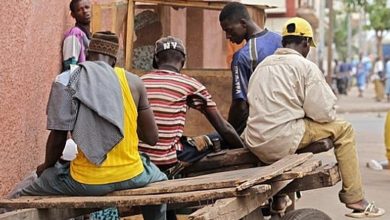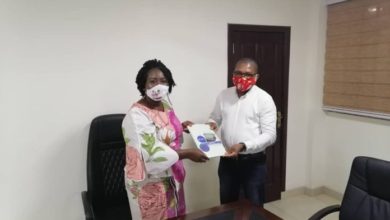BBS: Mango Farmers In Yilo, Manya and Shai Count Losses

Mango farmers in the country are calling on the Ministry Of Food And Agriculture and the key stakeholders in the sector to help them find a solution to the onslaught of the Bacterial Black Spot disease (BBS) which is posing a lot of threat to mango cultivation in the enclave.
Their concern arises out of the heavy losses they continue to suffer after investing huge sums of money into the mango business as a result of the devastation.
The farmers have thus called for an appeal for urgent action to help stop the spread of the disease on their crops, as it is ravaging farms, killing trees and destroying yet-to-mature fruits.
The disease causes cracks in both the trees and the fruit, resulting in the fruit getting rotten and dropping from the tree prematurely.
The disease is said to be spreading in the Yilo Krobo municipality, Lower Manya Krobo municipality, Shai Osudoku and other sectors of the southern zone. The disease is also said to be devastating mango-growing areas in the Brong Ahafo Region.
Miss Tracy Amponsah Awuku of Farm Management Services Limited (FMSL) who revealed the devastation suffered by the farm in the wake of the scourge told host, Austin Ofori Addo during last Saturday’s Agric Forum that the farm was at its wits end and has exhausted all attempts and steps taken to curtail the bacteria.
“We have engaged in many activities to control the outbreak including the buying of expensive chemicals and other bio-safety activities but all to no avail,” she lamented.
Miss Awuku said the farm was left with no option than to cut down some of the mango trees because the invasion was uncontrollable.
“We were left with no option than to cut down the trees after applying all the necessary measures which proved very little to curb the situation,” she said.
A visibly distraught Miss Awuku expressed worry over the situation which has adversely affected mango production on the farm.
“The outbreak has contributed seriously to the reduction of expected produce in 2017 during both major and minor seasons with over 70 per cent of the total production going waste,” she added.
Perhaps another major concern of affected farmers as Miss Awuku pointed out was how to defray loans taken from financial institutions to raise the farms.
“Some farmers took loans from banks and other credit facilities to invest into their farms expecting a good harvest but cannot boast of any profits after the season. I therefore urge the stakeholders involved to see this invasion as a national disaster and treat it accordingly to bring relief to the mango farmers,” she appealed.
She described the mango fruit as “green gold” and called for much attention and good policies to ensure that the sector contribute its quota to the economy for development and growth and reiterated that all, including both farmers and the stakeholders must come together to help fight the menace.
Several hectares of mango plantations in the affected areas have come under attack from the disease.
The situation compelled a workshop organized by the United States Agency for International Development (USAID) in partnership with the Soil and Research Center of the University of Ghana on Tuesday, December 5, 2018 at Somanya for mango farmers to be trained on how to identify affected mango plants and adopt best farming practices to avoid a further spread of the disease.
For now, affected mango farmers are still grappling with an effective chemical to tackle the situation because the use of all recommended chemicals have not still, the situation is still pending and if care is not taken in the next four to five years to come, Ghana will start importing mango into the country.
By Austin Ofori Addo/ritefmonline.org/austinofori.addo@gmail.com



